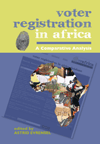Dear Reader,
We are pleased to announce the relaunch of the ACE Newsletter. Several months have passed since our last newsletter was circulated. Since then ACE has seen a lot of improvements: the Encyclopaedia is being reviewed, Comparative Data has been updated and the ACE Practitioners' Network has more members and is more active than ever before. Also, as the number of ACE users on mobile devices increases sharply we have launched ACE Apps and a mobile version of the ACE website.
In this edition of the newsletter we want to give you a few more details about some of these changes. We expect many more improvements over the next months. Please let us keep you informed about them and subscribe to future copies of the ACE Newsletter.
Best regards,
ACE Secretariat
Encyclopaedia Review
 One of our priorities for 2012 has been a complete update of the ACE Topic Areas. In cooperation with the ACE partners many updates are currently under way and one is already completed and available online:
One of our priorities for 2012 has been a complete update of the ACE Topic Areas. In cooperation with the ACE partners many updates are currently under way and one is already completed and available online:
The Boundary Delimitation Topic Area was reviewed and updated by
Herschell Sax, Elections Canada’s subject matter expert for boundary
delimitation from 1993 to 2011. Amongst others this topic area contains a completely new chapter on the usage of GIS for Boundary Delimitation.
The Practitioners' Network
|
Membership of the ACE Practitioners' Network has increased by over 50 percent in 2012 and the network has now over 650 actively participating members.
Every month election practitioners from 100 countries are logging in to the network.
Over the last months more than 70 questions and discussions have been posted and over 500 answers have been provided.
Based on this input by experts and practitioners in the field 55 Consolidated Replies have been published since January. Amongst them are replies to the following questions:
|
Minimum standard for voter registration rate:
The Election Commission of Nepal has created a new vote list (biometric data included) and the current registration rate is about 70 percent of eligible, in-country voters. On the question of what is an acceptable registration rate, it seems to me like you have to measure acceptance based on the commission's efforts to register all voters wishing to vote - i.e. how service-minded the commission is - rather than any specific rate. Nonetheless, 70 percent seems low to me. Is there some kind of consensus of a minimum standard that would make the process "acceptable" in a country context similar to Nepal?
Read more ...
Organizing voting from abroad within a short time frame
The revised electoral law (14 December 2011) of Mongolia states that voting from abroad will be possible for the June 2012 elections and the Electoral Management Body of Mongolia has now requested input from the Mongolian embassies and asked them to suggest ways in which voting can be implemented in the various countries where Mongolians are living abroad.
Obviously, the overarching issue here is timing. Considering the short time frame of only 4 months I have the following questions:
1. What are the best ways for involving citizens living abroad in national elections?
2. The experience of which country would you advise us to apply?
3. What issues and challenges were encountered by Embassies when they organized polling stations in their host countries and how they were addressed?
Read more ...
Comparative Data Updates

Comparative Data is a systematic collection of election-related
statistics and data covering more than 200 countries and 11 different
topics. With the help of several ACE Associate Member organizations over 10,000 data points for 174 countries and territories have been updated this year.
ACE on Mobile Devices

The number of ACE users on mobile devices has increased sharply from 1.5 percent in 2011 to over 5 percent in 2012. To better serve this growing user segment, the ACE Encyclopaedia and Practitioners' Network are now available in a mobile friendly format that works even on the smallest screens and slowest network connections. Additionally users of smart phones can install an ACE iPhone App and an Android App that gives them quick and easy access to ACE content.
Arabic Translations

The translation of ACE content into Arabic was already initiated before the events of the 2011 Arab Spring. The final stage of making the ACE Encyclopaedia available in Arabic was reached early in 2012 when the Parties and Candidates, Legal Framework, Boundary Delimitation and Electoral Integrity translations were published.
Since then we have already registered 75,000 visits of the Arabic language version of the ACE website.
ACE at Electoral Events
ACE Electoral Knowledge services were presented at several international electoral conferences and events including:
- UNDP/IFES regional forum on International Standards for EMBs, Egypt, April 2012
- Annual General Meeting of the Association of Caribbean Election Officials, Guyana, June 2012
- Annual European Conference of Electoral Management Bodies, Estonia, June 2012
- Biennial Conference of Commonwealth Network of Elections Management Bodies, Canada, June 2012
- Annual Conference of the Association of Central and Eastern European Election Officials, Bosnia and Herzegovina, September 2012
- Training Workshop for new SADC EMB Members, South Africa, September 2012
Events like the above are excellent opportunities for us to meet our target audience, showcase current activities, invite new network members and also to distribute some promotional material and information leaflets to further increase the visibility of ACE.
Recent Publications by ACE Partners and Members of the Practitioners' Network
 IFES Buyer's Guide 2012
IFES Buyer's Guide 2012
An industry-specific directory featuring information about companies selling voting equipment, electoral supplies and related professional services.
 Electoral Management during Transition: Challenges and Opportunities
Electoral Management during Transition: Challenges and Opportunities
The administration of elections during a transition from an authoritarian to a democratic regime is fraught with challenges. At the same time the transition offers decision-makers and election administrators opportunities to strengthen electoral management bodies as independent, impartial, credible and professional institutions. Recognizing the importance of policy choices to be made during democratic transition, this paper discusses some of the main issues to be considered and suggests recommendations to support policy-makers and practitioners in this area.
 Empowering Women for Stronger Political Parties
Empowering Women for Stronger Political Parties
This publication identifies targeted interventions for promoting the stronger presence and influence of women in political parties as well as advancing gender equality issues in party policies and platforms. The lessons learned and common strategies in this Guide are drawn mainly, but not exclusively, from 20 case studies that were commissioned by UNDP and conducted by NDI during 2009-2010.
 My Wonderful World of Elections
My Wonderful World of Elections
An Election Autobiography by Carl Dundas
"[...] virtually a Manual of Best Practices in election management and will be valuable to students and practitioners in the field, and indeed, to anyone who cherishes the principle that the will of the people shall be the basis of the authority of government." - Patrick Robinson, President ICTY
 Monitoring Democracy: When International Election Observation Works, and Why It Often Fails
Monitoring Democracy: When International Election Observation Works, and Why It Often Fails
In recent decades, governments and NGOs--in an effort to promote democracy, freedom, fairness, and stability throughout the world--have organized teams of observers to monitor elections in a variety of countries. But when more organizations join the practice without uniform standards, are assessments reliable? When politicians nonetheless cheat and monitors must return to countries even after two decades of engagement, what is accomplished?
 Voter Registration in Africa: A Comparative Analysis
Voter Registration in Africa: A Comparative Analysis
Ed. Astrid Evrensel, EISA 2010
A comparative analysis of voter registration in Africa. In conjunction with the UN Electoral Assistance Division, EISA implemented an electoral project by assessing voter registration systems throughout Africa. Cases studies included in this assessment covered eight countries: the Democratic Republic of Congo, Liberia, Malawi, Mozambique, Ghana, Rwanda, Senegal and South Africa.












